


Framed or unframed, desk size to sofa size, printed by us in Arizona and Alabama since 2007. Explore now.
Shorpy is funded by you. Patreon contributors get an ad-free experience.
Learn more.

- Lofty addition
- In 1912
- Keenan Building
- Six years old
- Taken from the P.J. McArdle Roadway?
- It stood only 47 years
- Three track mind
- Incline to the right
- Reach for the sky, 1912 style
- No clean sweep
- Same Job Title, Same Face
- Sadly Lost
- Beautiful ...
- Where you get your kicks
- Aim High
- Pueblo Revival sisters
- Pueblo Neoclassicism
- Milk Man
- Regional dialect.
- Spielberg's inspiration
- Great Photo
- Loaf Story
- Do you still have the Rakes category?
- Could almost be a scene from the 1957 movie 'Hell Drivers'
- The Wages of Fear.
- Conspicuous by their absence
- Got Milk?
- All that aluminum
- No lefties
- Smoke 'em if you've got 'em
Print Emporium
The Clerical Army: 1924
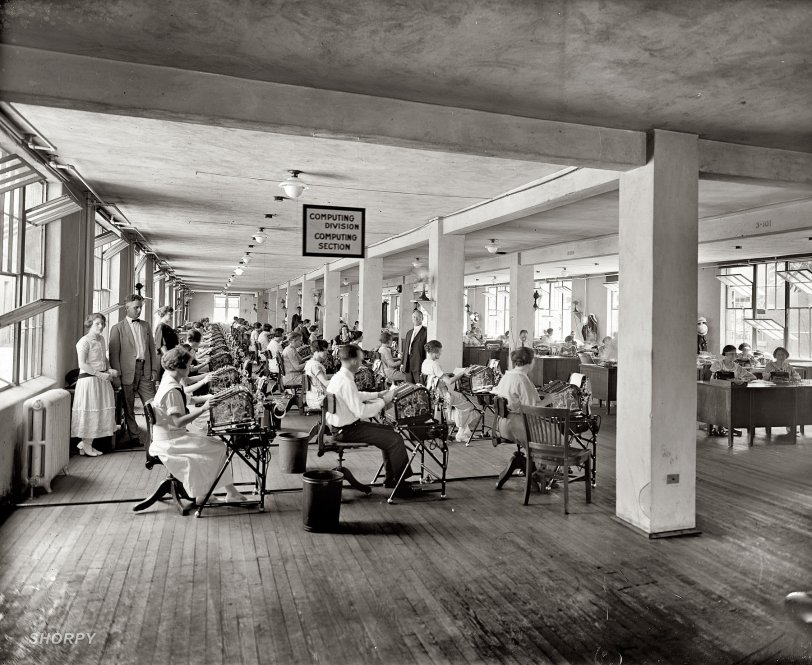
From 1924, another view of clerks calculating the "soldiers' bonus" for the War Department. View full size. National Photo Company Collection glass negative.
Tabulating Room
This appears to be the exact same room as the previous photo, but from an earlier date. The overhead lighting has not been installed, but the windows, fans and desks all appear the same.
A Shocking Degree of Non-Waste
The most shocking thing ever encountered in Shorpy: a time when the Government was actually trying to spend money prudently.
Summers Past...
When I was in school, we had similar windows and the tops had to be opened with a long hardwood stick, possibly about 6 feet long, made just for that purpose, which had a hook on the end that fit into the upper windows to pull them open. Sometimes the teacher would appoint the most responsible student to open the top windows, but the stick was stored in a safe place as it had potential to do some damage as a weapon. Another nostalgic memory are the girls in pastel summer dresses and white shoes, the men in seersucker suits, (and I'll bet they all had airy straw hats for streetwear). I am so dependent on looking at these old photos on Shorpy every day, it is now like a tobacco addiction. Thanks for the look back to the way we were, I love Shorpy.
War Department Building
I wonder if this and the earlier photo were taken inside one of the War Department temporary buildings that lined the Mall in Washington DC until the 1940's. See this photo from Wikipedia.
[The article below mentions the files being at "the historic old arsenal at Washington Barracks." Another article describes this work as taking place at the adjutant general's offices at Sixth and B. - Dave]
40,000 Johnsons
Reno Evening Gazette May 20, 1924 Page 6
TO PAY WAR BONUS MEANS GIGANTIC CLERICAL JOB
Associated Press
WASHINGTON, May 20. — Enactment of the war veteran bonus bill into law has laid upon the shoulders of the government departments an administrative task so huge that the figures involved stagger the imagination.
They must explore a veritable mountain of war records. From that mass of musty documents they must pick out the individual war histories of more than 6,898,000 men to provide the data upon which alone bonus payments of any kind can be made.
The daily service of every soldier, sailor or marine who served under the flag in the great war at home or abroad is subject now to minute examination. Through his days of sickness and health, of training at battle abroad the searchers must follow each man through the wilderness of official records. And the bulk of the task must be done in the close-packed filing cases of the War Department where the intimate official story of America at war alone is told.
In those records alone are more than 167,000,000 separate documents, each of which it may he necessary to handle many times before the veterans can all be assured of bonus payments. It will require twenty-seven separate checking operations to make the examination of the file and it will take 2800 clerks to do the work in the War Department alone.
There are amazing stories by the hundreds of thousands among these individual war records. There are tales of highest heroism, of great adventure; tales, too, rich in pathos and sacrifice. They are the war story of each one of the millions of men gathered into the vast volume of the files that must now lie opened for perusal. Among them are the brief records of the many who were called for service but to whom death came in the hospitals almost before they had taken their soldier oaths.
And among them also, never to be recognized for what it is, lies the brief story of America's Unknown Soldier, the record that would show, if it were in the power of man to pick it out, who he was and where he fought and how he died.
By comparison the army's share in the task of record searching overshadows the work that must also be done by the navy and marine corps to carry out the will of congress. In the many files are the records of 5,250,000 men who may make claims. Each must be examined as to the soldier's record before it can be passed upon. In the navy files are the records of 551,736 enlisted men and of 11,880 women who served in the rank of "yeoman-F." in the marine corps there are some eighty thousand records to be combed out.
The War Department files are located here in Washington. They are crowded into the three floors of the historic old arsenal at Washington Barracks, scene of many historic events. It was there that the conspirators were tried for the assassination of President Lincoln and close by is the spot where some of them paid the penalty with their lives.
The documents, grouped in their enveloped Jackets, are now set in soldierly ranks in 7,066 steel filing cases that placed end to end would cover more than five miles. They occupy 2.36 acres of floor space and they weigh 1,080 tons and would fill fifty-four freight cars.
The very compactness of the files adds to the task of ascertaining the individual stories they tell. It is physically impossible to employ more than the 2,800 who will be put to work about them. During the war the draft operations were far greater in scope because they dealt with men by the tens of millions. But that work was decentralized over the entire country and endless clerical help could be used. Now, the product of the draft in fighting manhood alone is to be dealt with, but that record is all here in the crowding file cases.
The War Department, and in cooperation with it, the other two military services, began preparatory work more than two years ago to make ready for the day when bonus legislation might be enacted. At that time Col. Robert C. Davis, then commanding a regiment of infantry at Plattsburg, N.Y., barracks, wan summoned to Washington to begin a study that has resulted in the completion of plans for the gigantic clerical machinery it now becomes his duty to set in motion as he is now adjutant general of the army.
The youngest of American major generals, Gen. Davis served in France as adjutant general of the American expeditionary forces. In that capacity he conceived and created the central war records office of the American land forces in France, an agency unequaled by the Allied armies. He began that work with himself and one clerk as the personnel of what ultimately reached a peak of seven thousand clerks, aside from the many officers it required.
It was against that background of experience that Gen. Davis visualized the task before him in Washington. He saw at once that there were three main elements in the war records of the army, the overseas records, the War Department original records, and the records of the embarkation service. He began his work by calling to his aid the officers who during the war had the greatest knowledge of each of those groups of records and it is with the aid of that staff of less than a score of tried and experienced "two-fisted" men that the plans were shaped in readiness for the bonus bill.
Some idea of the complications that must be met may be gained from the fact that the army files contain the records of 50,328 Smiths who served during the war; 40,101 Johnsons; 28,902 Browns and 27,938 men named Williams. In countless cases initials and even the first and second names are identical, yet the records must separate the one from the other and to each give his proportionate benefit completed on the actual service he tendered in the war.
Another complication foreseen lies in the fact that twenty-three per cent of all these five million potential claimants can not read nor write the English language. A corps of interpreters, having among them knowledge of almost every tongue, must be included in the great office force to deal with the analysis of the records.
The starting point for every veteran in seeking compensation must be the filling out of application blanks already printed. It is here that Gen. Davis fears there may be delay and to reduce that danger as much as possible, he has not only revised the form time and again to reduce it to the simplest possible terms, but has called in his aid the American Legion, patriotic and civic organizations and every ramifying agency of the Federal government over the country to distribute the blanks and to help the veterans fill them in.
"Do not pay fees other than a notary charge," runs the language of an emphatic notice which will be circulated everywhere. "The law prohibits any persons from charging a fee for assistance in the collection of the compensation."
Legion posts everywhere have agreed to serve not only Legion members but all war veterans in filling out the blanks. In the same way every army post or detachment, every national guard center, and every official of the Federal government of whatever kind will give voluntary aid to the veterans as they need it.
Gen. Davis has laid down one other rigid rule. Applications for blanks will not be received by the War Department directly from the veterans. There will be no necessity for that as the blank and the envelopes in which to mail them will be made available everywhere and correspondence direct with the department would crush it under the load of clerical work before it could begin on its real task.
When the applications are received they will go into a "receiving station" and notice will go back to the applicant that his case is in hand. From then on the application will move in orderly way through the ramifications of the files to be checked and rechecked time and again.
There will be reference wherever necessary to the muster rolls of regiments and even small detachments and there will be comparison of finger prints to insure identification. The applications which can be checked in the regular way will move directly through the main channels of the files. Where difficulties are encountered, however, the troublesome application will be promptly sidetracked to a "trouble clerk" for special treatment and in order that there may be no delay and congestion, in the main traffic.
Gen. Davis estimates that with the system he has mapped out it will be possible to attain an average output of thirty-thousand certificates, checked and delivered to the veterans' bureau, every day for six days of every week which means about nine months of work. In order to reach that average, however, the system devised has been made sufficiently flexible to reach a daily total output of seventy thousand certificates as a peak load in the full stress of the work.
The product of all this vast clerical labor will be in the typed certificates forwarded to the veterans' bureau containing the records of each man's service and the computation of the exact amount of compensation to which he is entitled under the law. It is from the War Department, navy and marine corps certificates that the checks for cash payments and the insurance policies will be filled out by the veterans' bureau and mailed to applicants.
WASHINGTON, May 19 -- The bonus bill provides for paid up 20-year endowment policies for veterans and cash payments to those not entitled to more than $50 in adjusted service credit.
Adjusted service credit, which will be the basis also of the valuation of the insurance policies, is figured at $1 a day for home service and $1.25 a day for overseas service, The first 60 days cannot' count. The maximum is fixed at 500 days.
All veterans up to and including the rank of captain in the army and marine corps and lieutenant in the navy would be entitled to the benefits of the bill.
The insurance certificates would be dated next January 1 while the cash payments would be nine months after enactment of the bill.
Chairs
Am I right in observing those chairs have no cushions? So, no air conditioning, the room was loud and you'd end the day with a sore behind. I hope the job had good benefits!
Change of Seasons
Comparing this photo to the previous posting, I expected to see the same individuals in the same seats. Not so. Not only is this a different day, its an entirely different season. In the previous photo, everyone was dressed in dark sweaters and the electric fans were stationary. Here, light colored short-sleeves abound, the fans are whirring, and the windows are wide open.
Also that very orderly line of wastebaskets has now appeared.
Clear measures of thriftiness in the following article regarding desks and electric fans but no mention of tabulators. If only Haliburton would show similar measures of patriotic "economies" with taxpayer dollars today.
Washington Post, Aug 26, 1924
Bonus Bureau Saves $250,000 in Salvage
Correspondence showing that the coat of equipping offices in the War and Navy Departments to handle the huge task of record searching required under the bonus bill has been reduced by nearly a quarter million dollars by utilizing surplus equipment of various departments, was made public yesterday by the War Department.
"This achievement was made possible by the adjutant general and his assistants and the cooperation of other agencies of the government," Brig. Gen H.M. Lord, director of the budget, wrote to Secretary Weeks in calling the matter to his attention. Gen Lord predicted "further economies" in the same way.
Among the items mentioned by Gen. Lord were 2,000 desks from surplus stocks, including 125 brought from Baltimore in army trucks, which he estimated represented a saving of $100,000. Another was 160 electric fans obtained from Brooklyn, N.Y. and put in shape by the typewriter repair force of the new office, the saving being placed at $2,240. More than $20,000, he added, was saved by reconditioning 350 old typewriters and the salvaging of old office supplies from other government departments added another $10,000.







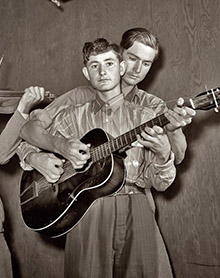

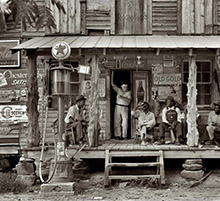
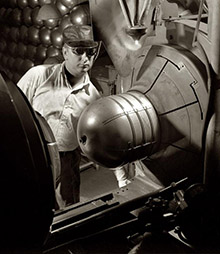






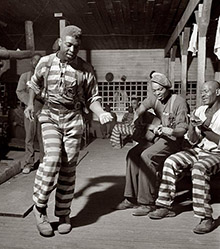







On Shorpy:
Today’s Top 5